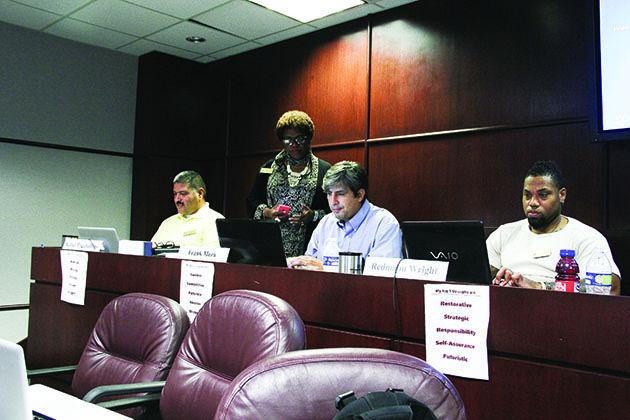For veterans with disabilities, starting a business can seem daunting. Entrepreneurship Boot Camp, an eight-day residency program for veterans, eases those hesitations.
As one of eight campuses nationally, A&M is hosting 25 veterans who throughout the week are teamed with mentors, coaches, professors and veterans who previously participated in the EBV program, to learn the skills necessary to achieve their entrepreneurial goals.
“The veteran unemployment rate is about twice where the normal civilian rate is,” said Richard Lester, director of the Entrepreneurship Boot Camp for Veterans and clinical associate professor at Mays Business School.
Through Saturday, veterans will receive one-on-one time to discuss business planning, creativity and innovation, marketing, management and opportunity recognition with local community mentors in a classroom setting.
“Their goal by the end of the week is to develop a one-page business plan for their business and a presentation of ten minutes to give to their mentors,” Lester said.
This year, Lester and his graduate students in the Master’s of Human Resources program at the Mays School reviewed 45 applications from Texas, New Mexico, Louisiana and Oklahoma, selecting 25 for the program.
Once accepted, the three-stage process begins with an online program for three weeks, a residency program on A&M’s campus for eight days and then a 12-month after-care program.
Lester said one of the many benefits of the program is the Aggie network’s involvement with the veterans and the services received long after the program is over.
“One of the comments we always get every year is that, ‘I never knew that any place like this existed in the United States,” Lester said. “It’s so very powerful to the veterans to see a very strong military connection. We showcase our University very well and they’re very appreciative of it.”
Lester said that the business schools involved in the program are all tier-one, world-class research universities, making the selection process very competitive. There are three criteria that apply to being accepted into the program.
“The first is that you’ve been on active duty since 9/11,” Lester said. “We do that because that is the most at risk veteran population right now. The second criteria are that you have a service-connected disability that’s verified and validated by the Veterans Administration. The third criteria, is that you want to start your own business. Those are the minimum qualifications. The extraordinary qualifications is if you’ve demonstrated some interest and effort in accomplishing your entrepreneurship goal.”
Lester said that after a pilot program at Syracuse University was launched in 2007, a few other schools joined to spread the program throughout the nation.
Texas A&M was one of the few schools to launch the EBV program following, Lester said.
Lester said there are many opportunities for the veterans to socialize during the program.
Wednesday, the local 4-H youth development organization hosted a dinner and students from the 4-H group gave letters to the veterans thanking them for their service.
“They get to hear the stories of the veterans,” Lester said. “It’s a very very powerful evening, it’s great. The 4-H mothers cook dinner for us, it’s basically a church social is what I call it.”
Gary Blair, head coach of the A&M women’s basketball team, will speak during dinner at the Traditions Club on Thursday evening. Saturday, a dinner will be held George Bush Presidential Dining Room at the Annenberg Center where there will be a bagpipe performance and Ross Volunteers will attend.
Kevin Doffing, Class of 2004 and EBV program student, said the veterans were enthusiastic about being on A&M’s campus.
“As a former student, I’ve seen [EBV] really build it up,” Doffing said. “The vets are real excited. I was a Fish Camp counselor for four years and these guys and girls throw out ‘Howdy’ with more enthusiasm than a fourth-day fish,” Doffing said.
Jesse Slone, of New Orleans, Louisiana, and student in the EBV program, said that the work hasn’t been too overwhelming, but it has been a good challenge.
“It’s exciting,” Slone said. “It’s really nice that it pushes you right to the edge of what you can keep up with. Texas A&M in general has been very welcoming and very supportive. You can see that everyone participating in the program can see they are very happy to be able to participate and really give us everything they can, so that’s been very nice.”
The start-up businesses should benefit both the veterans and other veterans looking for job opportunities, Lester said.
“One of the things that I see that happens is that by and large the majority of them want to help other disabled veterans,” Lester said. “So many times we see businesses and we see that they think ‘how can we pay it forward?’” Lester said.
Doffing said although he currently is a part of his family’s business, he appreciated the coaching and mentoring offered by the program and said it could only make his skills stronger.
“It’s refreshing from time to time and look back at your business objectively and have other people look at it and tell you what you need to do better,” Doffing said. “Because no matter how good you get at your business, it can always be better.”
A&M boosts veterans
July 17, 2014
Photo by Cody Franklin
Veterans attend a class to expand their business skills in the Wehner Building.
0
Donate to The Battalion
$2065
$5000
Contributed
Our Goal
Your donation will support the student journalists of Texas A&M University - College Station. Your contribution will allow us to purchase equipment and cover our annual website hosting costs, in addition to paying freelance staffers for their work, travel costs for coverage and more!
More to Discover










